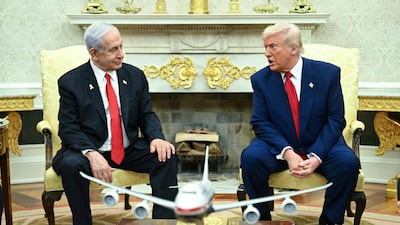Live updates: Follow the latest on Israel-Gaza
Israeli Prime Minister Benjamin Netanyahu’s efforts to defy an international arrest warrant could be in jeopardy if the US re-establishes ties with Iran, a former top war crimes prosecutor has told The National.
Luis Ocampo, who served as the first chief prosecutor of International Criminal Court from 2003 to 2012, said Mr Netanyahu remains free due to political influences such as Israel’s close relationship with the US. These ties have allowed Washington to lobby for Mr Netanyahu’s continued freedom, he said.
But all this is at risk, Mr Ocampo said, if the US normalises relations with Iran, as Washington and Tehran carry out negotiations on a new nuclear deal. An agreement could provide an overarching “solution” to the issues plaguing the Middle East, he added.
Mr Netanyahu opposed a nuclear agreement signed in 2015 between Iran and world powers, known as the Joint Comprehensive Plan of Action. President Donald Trump withdrew the US from the deal in 2018. It is unclear where Israel stands on the resumption of talks.
“Right now [Mr Netanyahu] is using his influence to get support from the US in particular, and European countries, to protect him in some way,” Mr Ocampo said. “But this protection is temporary.”
A nuclear deal, and a subsequent improvement of ties between the US and Iran could also be challenging for Mr Netanyahu's political career, he added.
Gaza effect
Israeli and international analysts have said Mr Netanyahu is deliberately prolonging Israel's offensive in Gaza is to delay his own corruption trial at home.
A month ago, Mr Netanyahu said he would not testify in one of the hearings in his trial after ordering an attack on Gaza that effectively ended a 42-day ceasefire there.
The ICC last year issued an arrest warrant for Mr Netanyahu and former defence minister Yoav Gallant over allegations of crimes against humanity in Gaza. It also issued warrants for three Hamas leaders who are all dead.
Mr Ocampo maintained that efforts to shield Mr Netanyahu from arrest are primarily for political reasons. “The legal decision was taken, it’s clear. The political game is highly complicated and has multiple actors,” he said.
The ICC does not have the ability to execute arrest warrants and has to rely on members of the Rome Statute, the court's founding document, to hand over wanted suspects.
Mr Ocampo said the body was not established to replace existing court systems but to “intervene where they fail”. Still, he believes that the ICC’s arrest warrants against Mr Netanyahu are already having an impact.
France last year said it would adhere to the ICC statutes to arrest Mr Netanyahu but President Emmanuel Macron later said the Israeli Prime Minister enjoys “immunity” from arrest.
Mr Ocampo said statements such as these are meaningless and have no bearing on reality. “Whatever they say, the warrant is there. To remove it, you need more than a statement by [Donald] Trump or sanctions against the prosecutor,” he said.
Mr Ocampo highlighted that because on a global scale the ICC, unlike in a national system, cannot send troops to implement a judge’s decision, states have to decide what to do about outstanding warrants for arrest.
The former ICC prosecutor believes that the US’s close relationship with Israel, will prompt Mr Trump to attempt to “protect” Mr Netanyahu from arrest. One way to do to that, he said, is for the US to play a role in the UN Security Council, where it has veto power, to suspend the investigation against Mr Netanyahu in exchange for peace in Gaza.
During the first week of April, Hungary announced it was withdrawing from the ICC as Mr Netanyahu visited his ally Prime Minister Viktor Orban.
SRI LANKA SQUAD
Upul Tharanga (captain), Dinesh Chandimal, Niroshan Dickwella
Lahiru Thirimanne, Kusal Mendis, Milinda Siriwardana
Chamara Kapugedara, Thisara Perera, Seekuge Prasanna
Nuwan Pradeep, Suranga Lakmal, Dushmantha Chameera
Vishwa Fernando, Akila Dananjaya, Jeffrey Vandersay
The specs: 2018 Opel Mokka X
Price, as tested: Dh84,000
Engine: 1.4L, four-cylinder turbo
Transmission: Six-speed auto
Power: 142hp at 4,900rpm
Torque: 200Nm at 1,850rpm
Fuel economy, combined: 6.5L / 100km
TRAP
Starring: Josh Hartnett, Saleka Shyamalan, Ariel Donaghue
Director: M Night Shyamalan
Rating: 3/5
Normcore explained
Something of a fashion anomaly, normcore is essentially a celebration of the unremarkable. The term was first popularised by an article in New York magazine in 2014 and has been dubbed “ugly”, “bland’ and "anti-style" by fashion writers. It’s hallmarks are comfort, a lack of pretentiousness and neutrality – it is a trend for those who would rather not stand out from the crowd. For the most part, the style is unisex, favouring loose silhouettes, thrift-shop threads, baseball caps and boyish trainers. It is important to note that normcore is not synonymous with cheapness or low quality; there are high-fashion brands, including Parisian label Vetements, that specialise in this style. Embraced by fashion-forward street-style stars around the globe, it’s uptake in the UAE has been relatively slow.
List of alleged parties
May 15 2020: PM and Carrie attend 'work meeting' with at
least 17 staff members
May 20 2020: PM and Carrie attend 'bring your own booze'
party
Nov 27 2020: PM gives speech at leaving do for his staff
Dec 10 2020: Staff party held by then-education secretary
Gavin Williamson
Dec 13 2020: PM and Carrie throw a flat party
Dec 14 2020: London mayor candidate Shaun Bailey holds staff party at Conservative
Party headquarters
Dec 15 2020: PM takes part in a staff quiz
Dec 18 2020: Downing Street Christmas party
A Prayer Before Dawn
Director: Jean-Stephane Sauvaire
Starring: Joe Cole, Somluck Kamsing, Panya Yimmumphai
Three stars
The specs
- Engine: 3.9-litre twin-turbo V8
- Power: 640hp
- Torque: 760nm
- On sale: 2026
- Price: Not announced yet
The specs
Engine: four-litre V6 and 3.5-litre V6 twin-turbo
Transmission: six-speed and 10-speed
Power: 271 and 409 horsepower
Torque: 385 and 650Nm
Price: from Dh229,900 to Dh355,000
In 2018, the ICRC received 27,756 trace requests in the Middle East alone. The global total was 45,507.
There are 139,018 global trace requests that have not been resolved yet, 55,672 of these are in the Middle East region.
More than 540,000 individuals approached the ICRC in the Middle East asking to be reunited with missing loved ones in 2018.
The total figure for the entire world was 654,000 in 2018.
Classification of skills
A worker is categorised as skilled by the MOHRE based on nine levels given in the International Standard Classification of Occupations (ISCO) issued by the International Labour Organisation.
A skilled worker would be someone at a professional level (levels 1 – 5) which includes managers, professionals, technicians and associate professionals, clerical support workers, and service and sales workers.
The worker must also have an attested educational certificate higher than secondary or an equivalent certification, and earn a monthly salary of at least Dh4,000.
The%20specs
%3Cp%3E%3Cstrong%3EEngine%3A%20%3C%2Fstrong%3E2.0-litre%204-cyl%20turbo%3Cbr%3E%3Cstrong%3EPower%3A%20%3C%2Fstrong%3E190hp%20at%205%2C600rpm%3Cbr%3E%3Cstrong%3ETorque%3A%20%3C%2Fstrong%3E320Nm%20at%201%2C500-4%2C000rpm%3Cbr%3E%3Cstrong%3ETransmission%3A%20%3C%2Fstrong%3E7-speed%20dual-clutch%20auto%3Cbr%3E%3Cstrong%3EFuel%20consumption%3A%20%3C%2Fstrong%3E10.9L%2F100km%3Cbr%3E%3Cstrong%3EPrice%3A%20%3C%2Fstrong%3EFrom%20Dh119%2C900%3Cbr%3E%3Cstrong%3EOn%20sale%3A%20%3C%2Fstrong%3ENow%3C%2Fp%3E%0A
SECRET%20INVASION
%3Cp%3E%3Cstrong%3EDirector%3A%3C%2Fstrong%3E%20Ali%20Selim%20%3Cbr%3E%3Cstrong%3EStars%3A%3C%2Fstrong%3E%20Samuel%20L%20Jackson%2C%20Olivia%20Coleman%2C%20Kingsley%20Ben-Adir%2C%20Emilia%20Clarke%20%3Cbr%3E%3Cstrong%3ERating%3A%3C%2Fstrong%3E%203%2F5%26nbsp%3B%3C%2Fp%3E%0A
Infiniti QX80 specs
Engine: twin-turbocharged 3.5-liter V6
Power: 450hp
Torque: 700Nm
Price: From Dh450,000, Autograph model from Dh510,000
Available: Now
In%20the%20Land%20of%20Saints%20and%20Sinners
%3Cp%3E%3Cstrong%3EDirector%3A%20%3C%2Fstrong%3ERobert%20Lorenz%3C%2Fp%3E%0A%3Cp%3E%3Cstrong%3EStarring%3A%3C%2Fstrong%3E%20Liam%20Neeson%2C%20Kerry%20Condon%2C%20Jack%20Gleeson%2C%20Ciaran%20Hinds%3C%2Fp%3E%0A%3Cp%3E%3Cstrong%3ERating%3A%20%3C%2Fstrong%3E2%2F5%3C%2Fp%3E%0A



